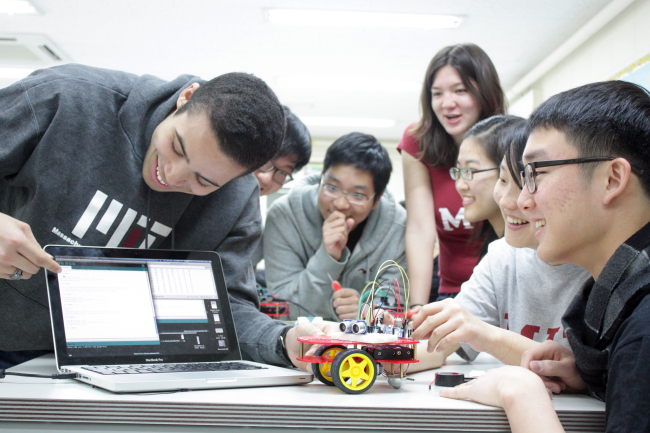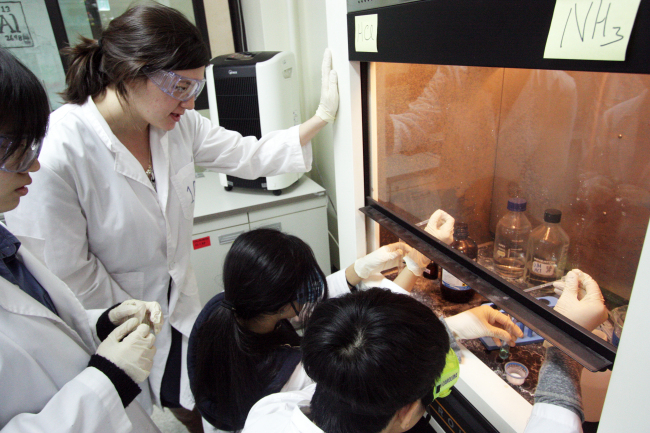Korea International School has launched new initiatives to prepare students for their high tech future.
In January, KIS brought a team of student-instructors from Massachusetts Institute of Technology to lead workshops with high school students and to consult and lead classroom science activities throughout the month. This coming January, the program will be repeated with two additional MIT participants and activities at the middle school level.
In the MIT partnership program, students explored computer programming, robotics, advanced chemical properties and applied physics.
KIS, with campuses in Gangnam, Bundang and Jeju, has long been seen as a leader in the use of educational technology. The school was the first in Korea to launch individual student computers with its personal laptop program in grades 6-12, and currently students in grades 3-12 have either personal laptops or iPads.
 |
KIS students participate in a programming class with MIT students. |
KIS also has a department of five full-time technology integrationists to train and support technology in the classrooms in addition to its regular IT staff that maintain the network infrastructure and equipment. Teachers are trained daily by the tech integrationists through the school’s Fish Bowl program that provides 20 technology training sessions for teachers each week as well as providing periodic sessions for parents.
KIS currently has clubs for coding, robotics, and computer applications such as Mine Craft, in addition to classroom technology instruction at all levels. Children as young as 3 years old have classes using iPads to begin acquiring basic computing skills which they will build on in higher grades.
One technology principle that is emphasized at KIS is that every student has access to high-powered technology tools daily. From grade 3 until graduation, students have their own computers, which have become workplace tools much as in the adult world.
KIS has promoted the perspective that technology devices are not toys at school; computers are how business and industry operates, and our children need to get used to using digital tools to do their work.
 |
Students at KIS and MIT partner up in an AP chemistry class. |
Along with using technology to do day-to-day tasks, KIS promotes a value-added use of computers called the SAMR Model. This process identifies different levels of computer use, beginning with substitution, using technology to do things that can be done without technology.
The next higher level of use is augmentation, which is using technology to do common tasks better and more efficiently. The third level is modification, which uses technology to do tasks in new ways for dramatically improved outcomes.
Finally, the highest level is redefinition, which enables student projects and tasks that were not even possible without technology. It is the ultimate opportunity for student innovation and creativity.
All the higher levels increase thinking skills, creativity and innovation, the skills needed most in the 21st century.
KIS intends to continue building on its 15 years of leadership in technology, including its first two years of partnering with MIT. KIS is committed to preparing students for their future through technology and other relevant strategies.
Possible directions for the MIT program include summer student programs, longer internships in the school, advanced coding programs, and STEM (science, technology, engineering and mathematics) overseas travel opportunities.
“Our students are capable of going as far as we can take them with technology, engineering and science; the sky’s the limit!” said school director Steve Cathers,
Additional information on Korea International School can be found at www.kis.or.kr.









